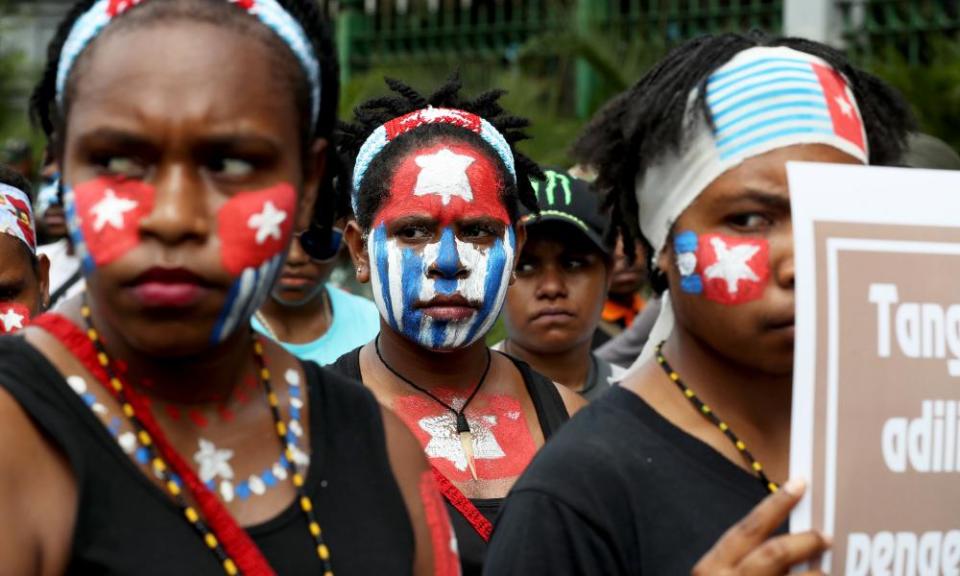‘We are living in a war zone’: violence flares in West Papua as villagers forced to flee

Violence has flared in West Papua, with journalists and activists targeted, an internet blackout, and villagers forced to flee into the jungle.
Hundreds of additional Indonesian soldiers have been deployed to West Papua in the last month and thousands of people have reportedly been displaced in the Puncak regency.
The military crackdown in Puncak has escalated since the death of a senior Indonesia police chief in a shootout with the West Papua National Liberation Army (TPNPB) in late April.
Related: My father works for the company that sells weapons used in my partner’s homeland | Izzy Brown
President Joko Widodo told Indonesian media he had ordered security forces to “chase and arrest all rebels”, while Bambang Soesatyo, chairman of the People’s Consultative Assembly (MPR), told the government to “destroy them first. We will discuss human rights matters later.”
Rode Wanimbo, women’s coordinator of the Evangelical Church of Papua, from Wamena, near Puncak, said the situation for local people as a result of the crackdown was dire.
“Thousands are displaced in Puncak, five villages fled into the jungle. Health clinics and schools have been taken over by the military. Soldiers are everywhere. We are living in a war zone.”
“Internet was blocked two days before conflict in Puncak flared, the government said it’s a problem with the cable, but it also happened during the 2019 West Papuan Uprising,” she said.
The 2019 uprising was a peaceful demonstration against systemic racism following attacks on Papuan students in Surabaya.
On 9 May, a key grassroots activist involved in organising the protest, Victor Yeimo, was arrested for treason, sparking fears of further political arrests in the current crackdown.
Prominent West Papuan journalist Victor Mambor was targeted in an attack that saw his car vandalised after his reporting on the shooting deaths of two Indonesian teachers in Puncak April.
Speaking to the Guardian from Jayapura, Mambor said his publication tabloid jubi reported on the shooting by the TPNPB “differently to state media, who only quoted military and police.
“Civilians in Puncak said they often saw the teachers carrying guns and suspected they were military spies, which we reported. First there was online abuse on social media, then my car was destroyed in the night.”
Mambor’s lawyer Veronica Koman said this latest incident “is because of his reporting on Puncak, the current hotspot of conflict, in another episode of harassment against Papuan journalists. When you report stories not in line with the government’s version you’ll be attacked.”
Benny Wenda, of the United Liberation Movement for West Papua (ULMWP) and interim president of the provisional government formed in December, called Victor Mambor: “one of the bravest Papuans today, for reporting the Indonesian force’s actions. They have targeted him and his journalists many times, arresting, harassing, and beating them. They want to silence Victor so he can’t cover the military crackdown in Puncak.”
On 29 April, Papuan “armed criminal groups” were formally declared terrorists by Mahfud MD, Indonesia’s coordinating minister of political, legal and security affairs.
Related: Protests flare in Papua as students demand independence referendum
Amnesty International has criticised the designation of TPNPB as a terrorist group, saying: “The government should focus on investigating these cases and stopping extrajudicial killings and other human rights violations in Papua and West Papua by law enforcement officials, rather than focusing on the terrorist label.”
Koman called the terrorist label “vague and dangerous. Jakarta is declaring war in West Papua. Already many Papuans civilians accused of being freedom fighters are killed by the military. Now Indonesian forces have new licence to kill them – as terrorists.”
A 2020 report by UN special rapporteurs on the human rights of internally displaced persons states there are over 50,000 displaced Papuans in the highlands region, but this figure may be higher now.
The contested Indonesian provinces of Papua and West Papua, often referred to collectively as West Papua, share an island with Papua New Guinea.
Indonesia has controlled West Papua since invading in 1963 and formalising its annexation through the controversial, UN approved, ‘Act of Free Choice’. Security forces are accused of severe human rights violations during the occupation with an estimated 500,000 Papuans killed.
The Indonesian state has always maintained that the West Papuan provinces are an uncontested, indivisible part of the Republic of Indonesia.

 Yahoo Finance
Yahoo Finance 